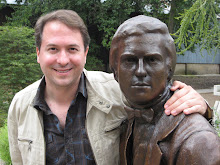Day Three
Wednesday afternoon, July 8th
This was quite a change of pace! Rather than focusing on the science, this session was all about theatre. Oxford lecturer and author Kirsten Shepherd-Barr did an excellent job examining the influence of Darwin in the world of Drama. She discussed this subject with two playwrights: Craig Baxter, who wrote the excellent "Re:Design", a dramatization of the correspondence between Charles Darwin and Harvard botanist Asa Gray, and Peter Parnell who wrote the play "Trumpery" about the effect of Alfred Russel Wallace's letter on Darwin. Joining them was Professor Stuart Firestein, a former dramatist turned neurobiologist, who had some interesting insights on both the theatre and science side of the equation. The main reason I was interested in this session was because I have an extensive background in theatre (I've been involved with acting for the past 28 years) and have even written my own Charles Darwin monologue, which I have performed over a dozen times around Vancouver (you can click on the links to see examples).
Craig's play "Re:Design" was commissioned by the Darwin Correspondence Project and he sifted through about 282 letters between Darwin and Gray to create his script. It was fascinating to me to hear how he had to search for a narrative thread in their correspondance, find the music and repeats in their relationship. Darwin's "voice" came very strongly to Craig while reading his letters, charming with self-deprecating humour, always questioning and cajoling Gray into helping him. The two men formed a life-long friendship and Asa Gray was Darwin's staunchest supporter in America. It was really neat to hear about the process that went into crafting this play, which I then attended the next evening (which I will cover in a future blog post).
I'm not sure what to say about Peter Parnell's (one of the producers of the TV show The West Wing) play "Trumpery" since I've never seen it, but wasn't very impressed with the description he gave us. It sounds like it plays too fast and loose with reality for my tastes, adding characters that didn't appear (Darwin's daughter Annie is a character, even though she had died four years earlier), combining historical figures (Lyell and Hooker) and condensing 7 years into two weekends. The Darwin in Parnell's play is driven by Oedipal guilt, worried that his theory is going to kill God/Father. His vomiting is a metaphor for Darwin's pent-up secrets. Wallace shows up to conduct a séance to contact Annie. I suppose I shouldn't judge it based just on the description, but well...
I was also happy to learn of other Darwin related plays out there: After Darwin (1998, Darwin and Fitzroy appear in a play within a play), Darwin Variations (2006) and This View of Life (2009, a one man show about Huxley).
I had to skip the second half of this session (Darwin in Poetry) so I could catch the second half of Universal Darwinism, which was a pro and con approach to using memetics to explain culture.
Friday, July 17, 2009
Subscribe to:
Post Comments (Atom)


No comments:
Post a Comment